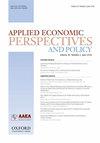覆盖作物、农业经济和政策
IF 3.3
2区 经济学
Q2 AGRICULTURAL ECONOMICS & POLICY
引用次数: 0
摘要
覆盖作物具有许多环境效益,包括养分隔离、改善土壤健康、去除二氧化碳和增加生物多样性。然而,农民往往没有获得足够的利益来保证种植覆盖作物,特别是当他们之前没有管理覆盖作物的经验时。因此,支持覆盖作物使用的公共政策可能是合理的,因为覆盖作物的正外部性大于覆盖作物项目的社会成本。目前的联邦项目没有提供足够的资金来促进大面积覆盖作物的使用。我们提出了一个旨在增加覆盖作物使用的联邦项目。本文章由计算机程序翻译,如有差异,请以英文原文为准。
Cover crops, farm economics, and policy
Cover crops have many environmental benefits, including nutrient sequestering, soil health improvements, carbon dioxide removal, and biodiversity increases. Yet, farmers often do not receive enough benefits to warrant planting cover crops, particularly when they have no prior experience with managing cover crops. Therefore, public policies supporting cover crop use may be justified because of the positive externalities of cover crops are greater than the social cost of cover crop programs. Current Federal programs do not provide enough funding to elicit large cover crop use. We present a Federal program designed to increase cover crop use.
求助全文
通过发布文献求助,成功后即可免费获取论文全文。
去求助
来源期刊

Applied Economic Perspectives and Policy
AGRICULTURAL ECONOMICS & POLICY-
CiteScore
10.70
自引率
6.90%
发文量
117
审稿时长
>12 weeks
期刊介绍:
Applied Economic Perspectives and Policy provides a forum to address contemporary and emerging policy issues within an economic framework that informs the decision-making and policy-making community.
AEPP welcomes submissions related to the economics of public policy themes associated with agriculture; animal, plant, and human health; energy; environment; food and consumer behavior; international development; natural hazards; natural resources; population and migration; and regional and rural development.
 求助内容:
求助内容: 应助结果提醒方式:
应助结果提醒方式:


